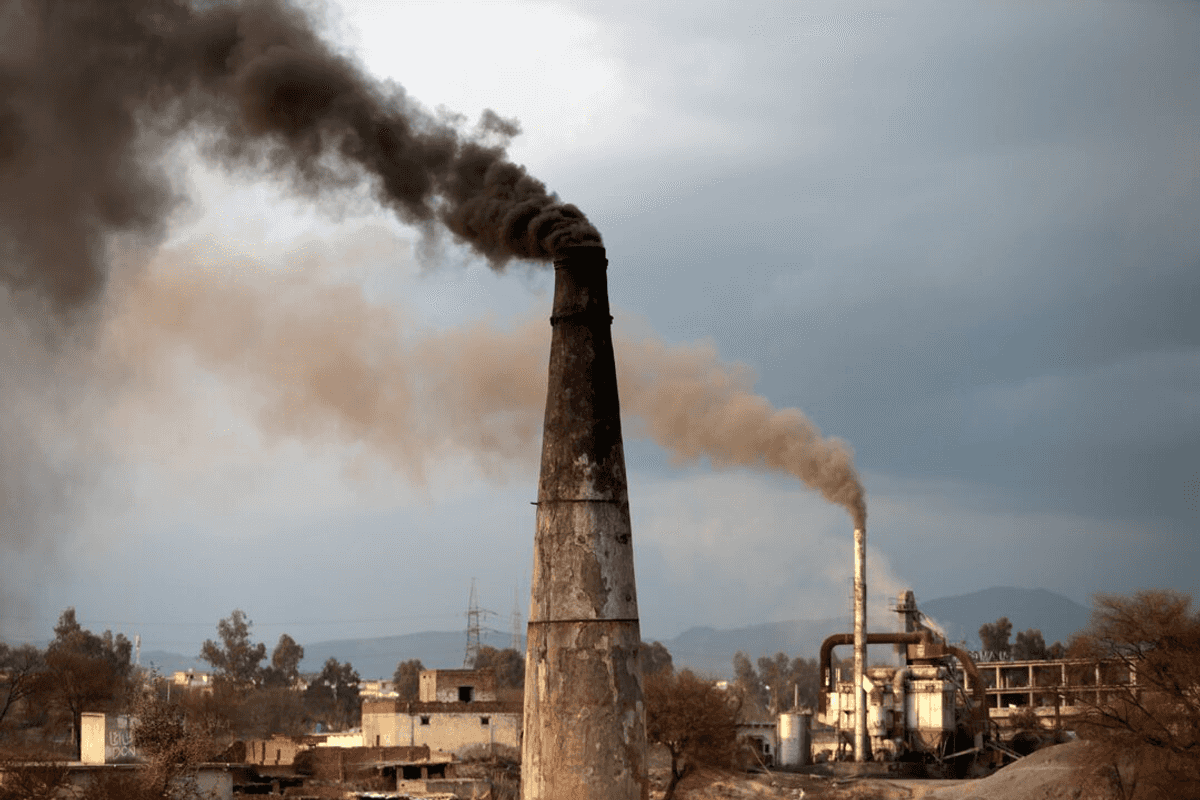Reforms can unlock '$2B carbon market revenue' for Pakistan
Transparency International Pakistan calls for new laws and data systems to earn money from carbon trading
Business Desk
The Business Desk tracks economic trends, market movements, and business developments, offering analysis of both local and global financial news.

Smoke rises from asphalt and brick factories in Islamabad.
Reuters
Pakistan can earn a revenue of $400 million to $2.25 billion each year if it manages to cut even 10 to 15% of its annual greenhouse gas (GHG) emissions through verified carbon reduction projects, Transparency International Pakistan (TIP) has estimated.
In its latest report, “Carbon Markets Readiness in Pakistan: Addressing Governance Gaps and Safeguarding Against Integrity Risks,” TIP has called for urgent reforms to strengthen governance and integrity in the country’s emerging carbon markets, calling it a “multi-billion-dollar opportunity” in climate finance.
According to Pakistan’s updated Nationally Determined Contributions (NDCs), submitted to the UNFCCC in 2021, the country intends to reduce its projected carbon emissions by 50% by 2030. The country aims to achieve this goal by sourcing 60% of its energy from renewable sources, achieving 30% electric vehicle penetration in new motor vehicle sales by 2030, and phasing out imported coal.
On the adaptation front, national priorities include safeguarding the agricultural sector, which accounts for around 20% of GDP, as well as protecting forests, water systems, coastal ecosystems, and air quality, strengthening urban resilience, and enhancing human capital through investments in health, education, and skills development
However, these targets are heavily dependent on funding from bilateral and multilateral partners — 35% is conditional upon international support, estimated to be around $101 billion by 2030.
Meanwhile, the World Bank estimates that Pakistan will require approximately $348 billion in total investment between 2023 and 2030 to mount a comprehensive response to its climate challenges. Of this amount, $152 billion (44%) is allocated for adaptation and resilience measures, while $196 billion (56%) is needed for decarbonization efforts.
Historic data shows substantial gaps between climate finance needs and actual flows, TIP said.
Over the past decade, Pakistan has secured an average of $1.4 to 2 billion annually in climate-related financing, with a peak of approximately $4 billion in 2021 — still far below the required levels.
Gaps between policy and practice
The TIP report has highlighted a significant disconnection between Pakistan’s aspirations and the systems needed in place to materialize them, like carbon markets.
“The absence of a clear, consolidated national emissions baseline is a major barrier,” the report states.
It points out that Pakistan lacks adequate technical infrastructure for emissions accounting, monitoring, and verification, legal frameworks on credit ownership, and market design tools such as registries and crediting methodologies.
TIP recommends establishing a dedicated carbon markets team within the Ministry of Climate Change & Environmental Coordination and its provincial counterparts to address these gaps.
Need for transparency and reforms
Kashif Ali, the Executive Director of TIP, emphasized that transparency must be foundational to any carbon market mechanism.
“Without clear and accessible information on how decisions are made, how benefits are allocated, and what safeguards exist for affected communities, trust in these mechanisms runs the risk of being eroded,” Ali said. “Publicly available benefit-sharing frameworks and community participation are critical for ensuring the integrity of Pakistan’s carbon markets.”
The report outlines key recommendations to strengthen Pakistan’s readiness for carbon trading, including:
- Robust Data Infrastructure: Develop emissions baselines tailored to key sectors and project types.
- Institutionalized Safeguards and Public Participation: Implement frameworks for grievance redress mechanisms.
- Comprehensive Carbon Market Law: Enact legislation to provide a legal mandate for all carbon trading activities.
- National Carbon Coordination Council: Establish a centralized governance body to coordinate across ministries and provinces.
- Technical Training and Capacity Building: Build capacity at all levels of government and across sectors such as climate, energy, statistics, and forestry.
- Phased and Adaptive Strategy: Pilot and evaluate early-stage projects like the Delta Blue Carbon Mangrove Initiative and Sapphire Wind Farm.
- Enhanced International Linkages: Create a public registry to improve transparency and global credibility of Pakistan’s carbon transactions.
Justice (retired) Zia Perwez, Chairman of TIP, said Pakistan has to take climate finance seriously by addressing “governance bottlenecks”.
“Carbon markets, if designed properly, can be a strategic tool not only for emissions reduction but also for unlocking much-needed foreign investment,” he said.







Comments
See what people are discussing